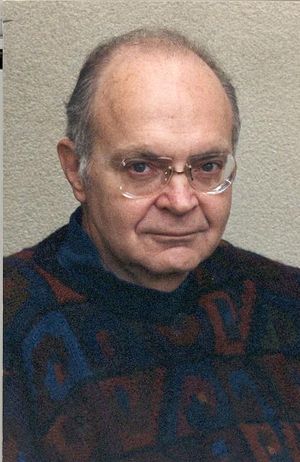Donald E. Knuth
- Birthdate
- 1938/01/10
- Birthplace
- Milwaukee, WI, USA
- Associated organizations
- Stanford University
- Fields of study
- Computing
- Awards
- IEEE John von Neumann Medal, IEEE Honorary Membership
Biography
Donald E. Knuth was born on January 10, 1938 in Milwaukee, Wisconsin. He studied mathematics as an undergraduate at Case Institute of Technology, simultaneously writing software at the Computing Center, and was awarded both the B.S. and Master's degrees in 1960. He received a Ph.D. in Mathematics from the California Institute of Technology in 1963, and then remained on the mathematics faculty. Throughout this period he continued to be involved with software development, serving as consultant to Burroughs Corporation from 1960-1968 and as editor of Programming Languages for ACM (Association for Computing Machinery) publications from 1964-1967.
Dr. Knuth joined Stanford University as Professor of Computer Science in 1968, and was appointed to Stanford's first endowed chair in computer science nine years later. As a university professor, he introduced new courses into the curriculum, notably Data Structures and Concrete Mathematics. In 1993, he became Professor Emeritus of The Art of Computer Programming. Dr. Knuth has supervised the dissertations of 28 students.
In 1962, Dr. Knuth began work on textbooks about programming techniques, which evolved into a projected seven-volume series entitled, The Art of Computer Programming. Volumes 1-3 were published in 1968, 1969, and 1973, and he is now working full time on the remaining volumes. Approximately one million copies have been printed including translations into six languages. Dr. Knuth interrupted the textbook series project and spent the next ten years working on digital typography. He developed the TEX system for document preparation, and the METAFONT system for alphabet design. Noteworthy byproducts of those activities were the WEB and CWEB languages for structured documentation, and the accompanying methodology ofLiterate Programming. TEX is now used to produce much of the world's scientific literature.
Dr. Knuth's research papers have been instrumental in establishing several subareas of computer science and software engineering: LR(k) parsing; attribute grammars; the Knuth-Bendix algorithm for axiomatic reasoning; empirical studies of user programs and profiles; analysis of algorithms. In general, the focus of his work has been the search for a proper balance between theory and practice.
Dr. Knuth received the ACM Turing Award in 1974 and was elected an Honorary Member of the IEEE in 1982. He is a member of the American Academy of Arts and Sciences, the National Academy of Sciences, the National Academy ofEngineering, and a foreign associate of l'Academie des Sciences (Paris) and Det Norske Videnskaps-Akademi (Oslo). He holds 5 patents and has published approximately 160 papers, and 16 books.
He has received numerous awards including the U.S. Medal of Science from President Carter (1979); the American Mathematical Society's Steele Prize (1986); the New York Academy ofSciences Award (1987); the]. D. Warnier Prize (1989); and the Adelskold Medal from the Swedish Academy of Sciences (1994); the IEEE Computer Pioneer Award (1982); the IEEE Computer Society's W. Wallace McDowell Award (1980). He holds honorary doctorates from a dozen international colleges and universities.
Dr. Knuth lived on the Stanford campus with his wife, Jill. They have two children, John and Jennifer. Music is his main avocation.
